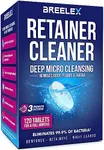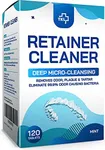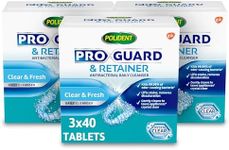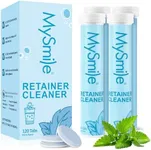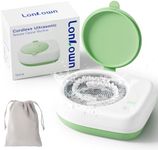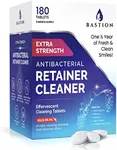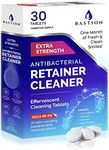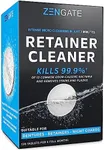Buying Guide for the Best Dentures Cleaners
Choosing the right denture cleaner is essential for maintaining the hygiene and longevity of your dentures. A good denture cleaner will help remove stains, plaque, and bacteria, ensuring your dentures remain fresh and comfortable to wear. When selecting a denture cleaner, consider the type of cleaner, its effectiveness, ease of use, and any specific needs you may have, such as sensitivity to certain ingredients or the need for a quick cleaning solution.Type of CleanerDenture cleaners come in various forms, including tablets, powders, pastes, and ultrasonic solutions. Tablets and powders are typically dissolved in water to create a cleaning solution, while pastes are applied directly to the dentures. Ultrasonic cleaners use sound waves to remove debris and bacteria. The type of cleaner you choose depends on your personal preference and how you plan to use it. Tablets and powders are convenient for overnight soaking, pastes are good for a quick clean, and ultrasonic cleaners offer a thorough cleaning with minimal effort.
EffectivenessThe effectiveness of a denture cleaner is crucial for ensuring your dentures are free from stains, plaque, and bacteria. Look for products that are specifically designed to kill bacteria and remove tough stains. Some cleaners also offer whitening properties to keep your dentures looking their best. To determine the effectiveness, read reviews and check for any clinical studies or endorsements from dental professionals. If you have heavily stained dentures, you may need a more potent cleaner, while regular maintenance may only require a milder solution.
Ease of UseEase of use is an important factor when choosing a denture cleaner. Consider how much time and effort you are willing to invest in cleaning your dentures. Tablets and powders that dissolve in water are generally easy to use and require minimal effort. Pastes may require more manual scrubbing, while ultrasonic cleaners do most of the work for you. If you have limited dexterity or prefer a hassle-free solution, opt for a cleaner that requires minimal handling and preparation.
IngredientsThe ingredients in a denture cleaner can affect its suitability for your needs. Some cleaners contain harsh chemicals that may cause irritation or allergic reactions, while others use natural ingredients that are gentler on the gums and mouth. If you have sensitive skin or allergies, look for hypoallergenic or natural denture cleaners. Additionally, some cleaners are free from artificial colors and flavors, which can be beneficial if you prefer a more natural product. Always check the ingredient list to ensure the cleaner is safe and suitable for your specific needs.
Cleaning TimeThe time it takes for a denture cleaner to work can vary significantly. Some cleaners require overnight soaking, while others can clean your dentures in as little as 5 to 15 minutes. If you prefer a quick cleaning solution, look for products that offer fast-acting formulas. On the other hand, if you don't mind leaving your dentures to soak overnight, you can opt for a cleaner that works more slowly but may offer a deeper clean. Consider your daily routine and how much time you can dedicate to cleaning your dentures when making your choice.


